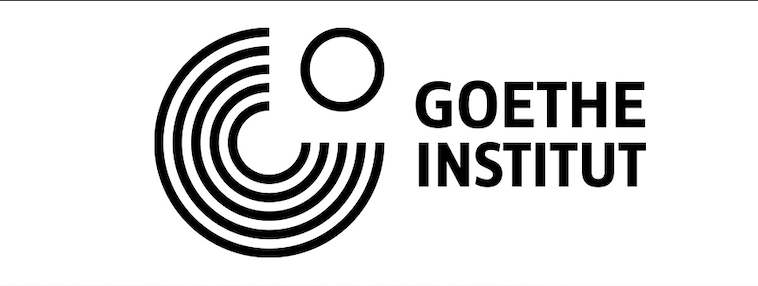CHAINS OF STEEL AND SMOKE
THE LEGACY OF EXPLOITATION - WAYS BACK TO EARTH
DISCOURSE THEATRE: From colonialism to climate injustice
With the project ‘Chains of Steel and Smoke - the Legacy of Exploitation - Ways Back to Earth’, we are building a bridge between the topics of colonialism and climate injustice. We are collaborating with artists and activists from Cameroon to explore the traces of colonialism and the effects of climate change. Our aim is to give local people a voice so that they are not relegated to marginalised figures in the context of climate justice, which directly affects them.
Cameroon is severely affected by the consequences of climate change, while the reappraisal of German colonial history is largely lacking. The project creates space for a creative and critical exchange that enables both a historical review and a future-oriented dialogue. In this way, we want to raise public awareness of the topic ‘Chains of steel and smoke - the legacy of exploitation - ways back to the earth’ in Cameroon and Germany.
In addition to the development of a theatre play, short films and interviews were made with experts from the fields of culture, history and ecology, whose contributions can be seen on this page. We asked them and ourselves the following questions:
How has colonialism shaped the economic and ecological structures in the former colonies, and what long-term effects does this have on the climate crisis in these regions? What role do historical mechanisms of exploitation, such as land grabbing and resource exploitation, play in today's ecological injustice between the global North and South? To what extent do the industrialised nations bear a historical responsibility for the current climate challenges in the former colonies, and how can this responsibility be taken into account in climate policy? How can the perspectives and experiences of people in former colonies be included in the global discussion on climate justice in order to shape a fairer and more sustainable future? Previous performances:
•11-December 2024. 7pm- Camp artistique [Nkoabang]
•12-December 2024. 7pm- Cameroon Cultural Centre [Yaounde]
•13-December 2024. 7pm- Afro Topos Cultural Laboratory [Yaounde]
•14-December 2024. 7pm- La’akam [Bafoussam]
A tour with guest performances in Europe is being planned.
Impressions of the performance, our trailer:
Authors of the play: Jens VILELA NEUMANN and Landry NGUETSA. Cast: Massan A BIROKO, Mahoussi KOTCHE, Evan Boris LYONGA, Landry NGUETSA Costume and set design: Evan boris LYONGA, Fadimatou MANKPA Production assistance and lighting direction: Clémence DJOUSSE
Excerpts from the play, translated from French:
It spread like an epidemic, from the beach where the foreign ships arrived, through the harbours they built to land there, eastwards along the railway line and the roads they built that led straight to the mines, plantations and farms from which they took what they wanted! They called it development, but a development that did not consider the interests of the country's inhabitants, only their own profit. The people of the north, armed with their knowledge and thirst for conquest, declared that everything could be owned and divided up. Every piece of land became individual property, every piece of land that could be exploited. The societies of origin, for their part, did not recognise this language of ownership and borders...
The meeting was therefore a clash of cultures. The people from the north, with their power and their laws, wanted to mark the land with their symbols. But the locals marked the land invisibly, through their traditions, rituals and songs. They knew that the land belonged to everyone, the living, the dead and those who were yet to come. For them, the land was the soul of the world and not just a material possession. Time passed and the people of the Land of the Sun liberated themselves. They now owned their own land, but much had not changed, and with time and neo-colonialism they had lost the ability to feed for themselves.
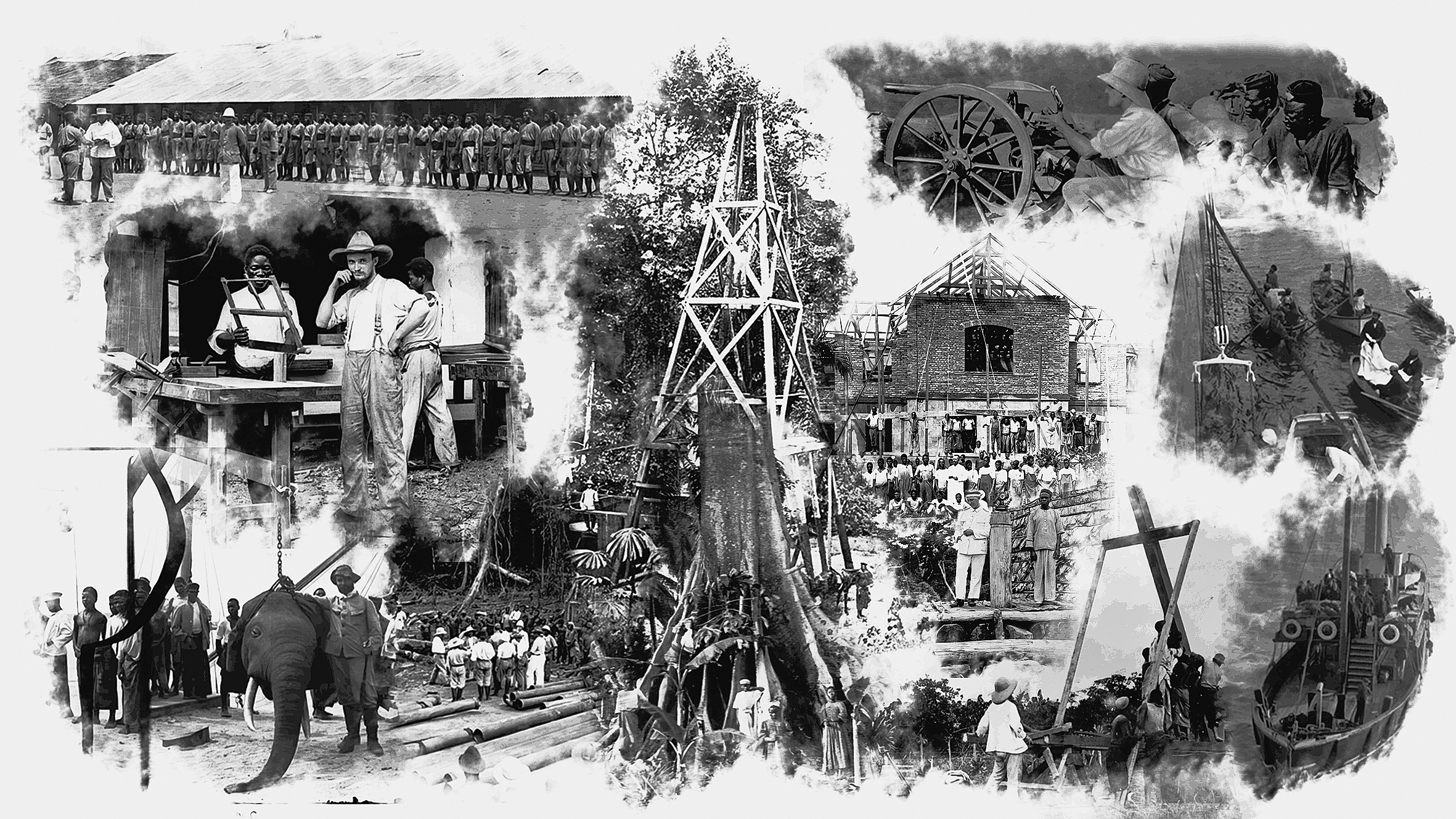
Photos: from the Bundes Archiv / Artworks & Collages: Fabrice Mani
Excerpts from the play, translated from French: Economics put pressure on politics in the countries of the North, there was too much to gain in the land under the sun, cheap resources, new customers, strategic outposts and the hope of a place in the sun. It was these colonisers from the north who merged a multitude of societies between the Atlantic and Lake Chad into one territorial unit and then called this entity ‘the beautiful land under the sun’. Foreign concepts were also forcibly introduced in the process, such as: Land registers, registry offices, alcohol laws, new governance structures, monetary systems, plantation societies or state schools... and most of them are still at work today.
You dream of an ecovillage... I know what you mean. But at my age, I don't know if I can change. The land I've farmed for so many years is enough for me. It's hard to start all over again. It's easier to sow, harvest and sell. But the people in the north have their markets and their needs. We are stuck. Look where that has got us over the last 150 years! We import everything we need. And ever since we got rid of the people from the north, we've been bouncing from one economic crisis to the next. Now we are at a crossroads. The land is speaking to us and we are no longer listening. It is demanding justice. But how? How can we save it and at the same time fight those who want to exploit it? This is not a question of courage, but of survival.
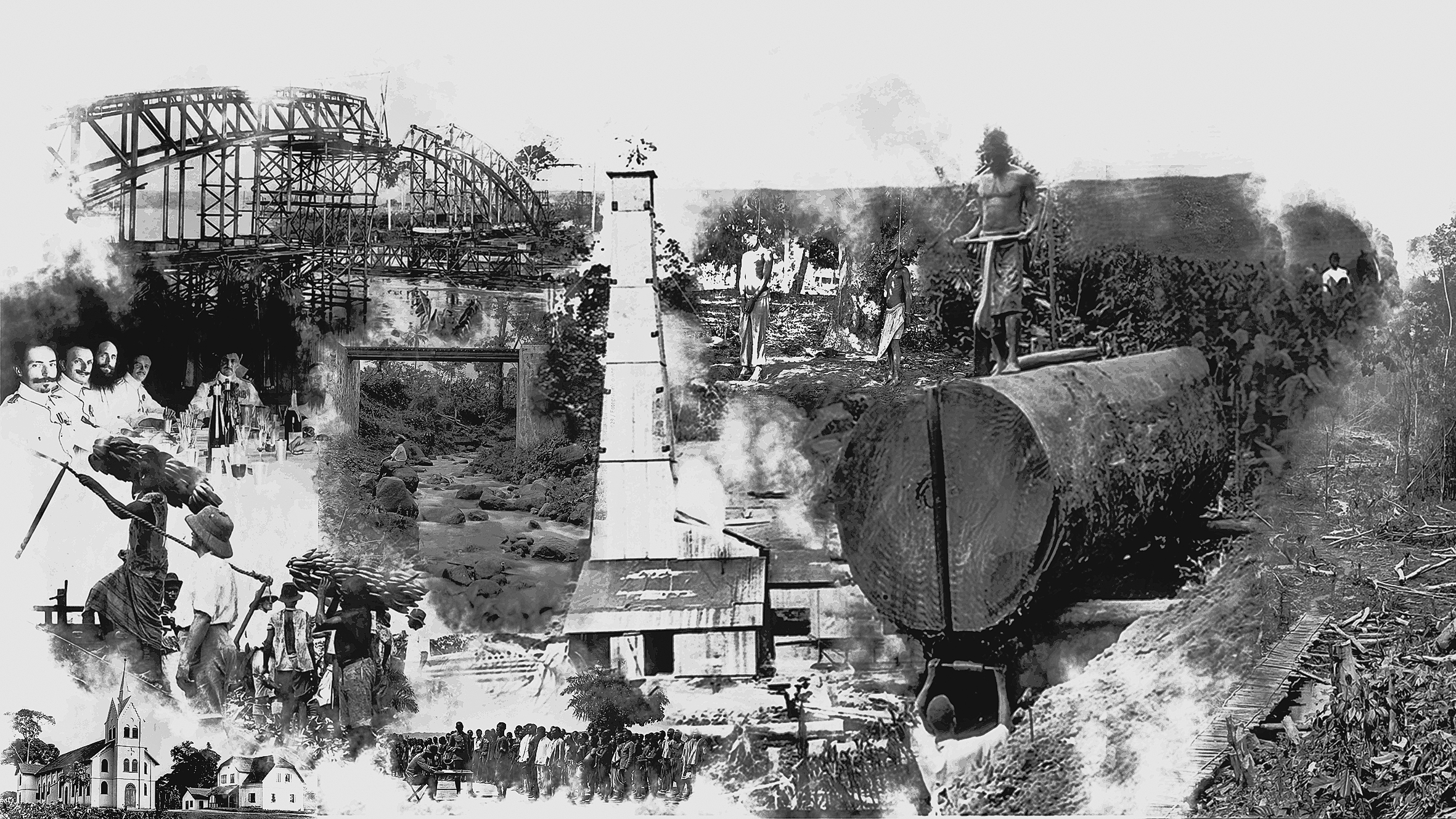
Photos: from the Bundes Archiv / Artworks & Collages: Fabrice Mani
Excerpts from the play, translated from French: What do you suggest? Go back to the time when we were still hunter-gatherers? Didn't the colonisers have it so easy with us, because they had the advanced technologies and we didn't? We are falling into the same trap as the people who came here to rob us. So we will only cause more damage, more violence against nature, against the underprivileged. We will only repeat the mistakes of others and live on mountains of things we don't need and that don't make us happy, with high walls around us and dirty cars that will only get dirtier. Without the trees in the forests that have been cut down because everyone wants this furniture made of tropical wood ... It's not the market that should guide our decisions. It's the earth. And even if the market for cotton disappears, there are other ways, such as ecovillages. Permaculture means growing sustainably so that the earth always gives something, no matter how long it takes. Creating autonomous communities where every need is met by the earth itself.
Impressions of the performance:

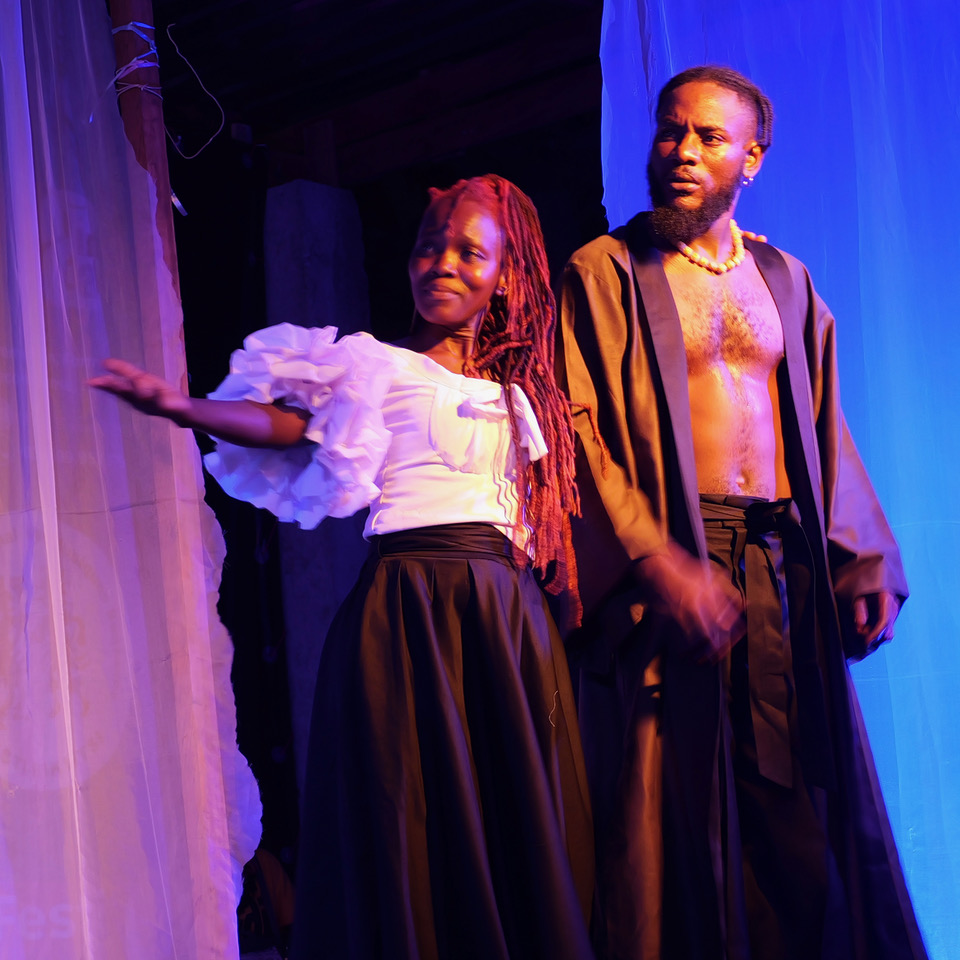
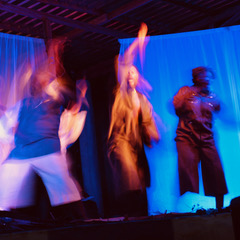



Cast: Massan A BIROKO, Mahoussi KOTCHE, Evan Boris LYONGA, Landry NGUETSA
Climate crisis in Cameroon
Climate change poses an increasing threat to Cameroon as the country is affected by rising temperatures and extreme weather events. Average temperatures in Cameroon have risen by 1°C over the last 50 years and projections show a possible increase of 1.5°C to 2°C by 2050. This warming is contributing to a decline in agricultural productivity as yields of crops such as maize, cassava and cocoa decrease. In the north, prolonged droughts have led to water shortages affecting over 1 million people. In the southern regions, on the other hand, there is heavier rainfall and flooding, displacing thousands of people and damaging infrastructure. The World Bank estimates that climate change could reduce Cameroon's GDP by 2% annually by 2050. Forests, which are crucial for both biodiversity and carbon sequestration, are also threatened by changing rainfall patterns and deforestation. Rural communities bear the brunt, with over 70 per cent of the population relying on agriculture for their livelihoods. Rising sea levels pose a threat to coastal cities such as Douala, threatening homes, infrastructure and industry. Immediate action is needed to mitigate these risks and adapt to climate change.
Like Cameroon, the continent is already suffering from extreme weather events and changing rainfall patterns linked to climate change, leading to droughts and floods. With a rapidly growing population, this has an impact on food supply and poverty and leads to migration and conflict. Many rich countries seem to expect the so-called emerging economies to make the leap to clean energy technologies, but are not really prepared to make the necessary investments. Vulnerable African communities need help to adapt to the inevitable impacts of climate change and their voices need to be heard, as there is much traditional knowledge and expertise on the ground that has been ignored. Policies are often implemented without the involvement of local communities and without their consent.
Fairytales on the subject:
MAHOUSSI KOTCHE tells her story from THE SACRED FOREST OF NGWATÈ
Nyhomog Lyonga Evan Boris tells his story: SOUNDS OF NATURE
TRACES OF THE GERMAN COLONIAL ERA IN YAOUNDÉ, CAMEROON 2024
Yaoundé / Cameroon 2024: Timber transport and processing
Interviews on ‘climate justice’ and the link to colonialism:
IInterviews avec Herman Koh / Better World Cameroon, Jean David Nkot, Sunday Geofrey / Support Humanity Cameroon (SUHUCAM)
Interview on eco-activism and art with Christian Etongo (Yaounde / Cameroon) Subtitles in English via CC button
Interview with anthropologist: Bingono Bingono on the relation between spirituality and climate crisis
Owona Ntsama on the colonial dimension of environmentalism
Interview with filmmaker J-P Bekolo on Afro-futurism, colonialism and the relation from humans and nature
Conversation with Samy Manga about poetry and environmental activism (in French with English subtitles)
Press:
Presentation of the project "Chains of Steel and Smoke" by J.V.Neumann at National TV
Presentation of the project "Chains of Steel and Smoke" by Landry Nguetsa at National TV
Presentation of the project "Chains of Steel and Smoke" by J.V.Neumann at National TV
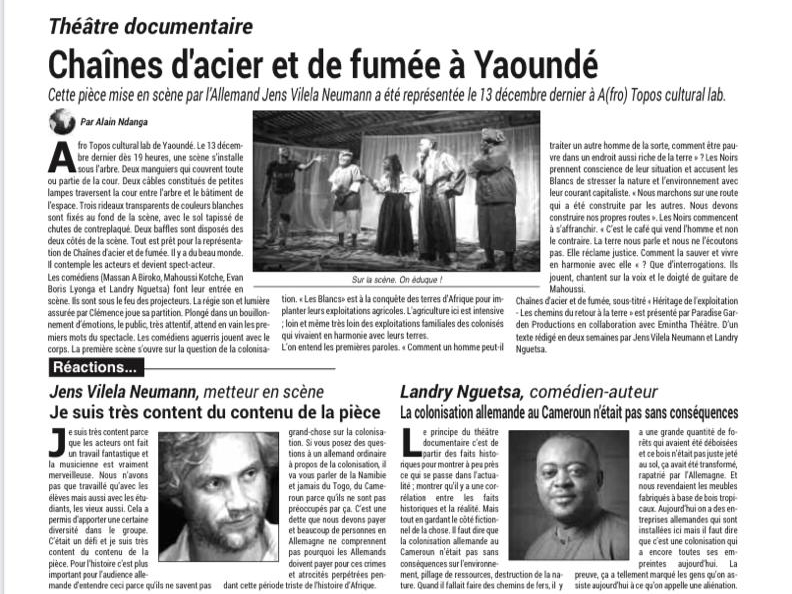
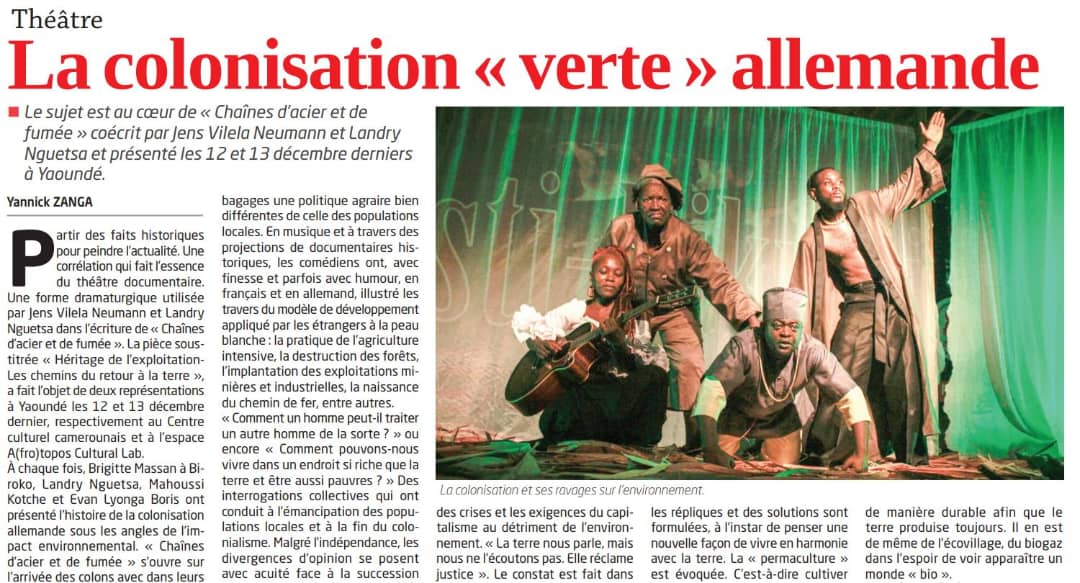
THE TEAM IN CAMEROON
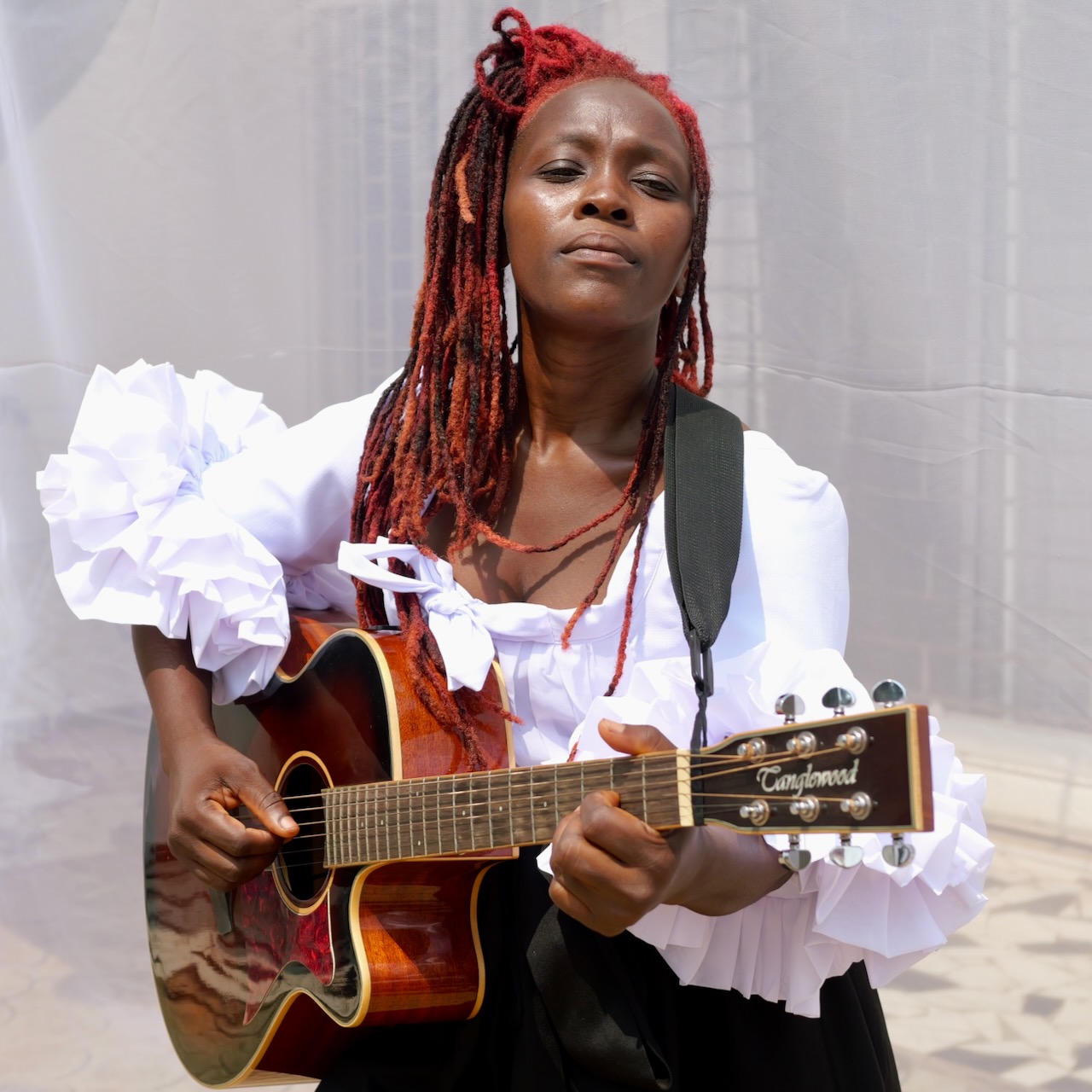
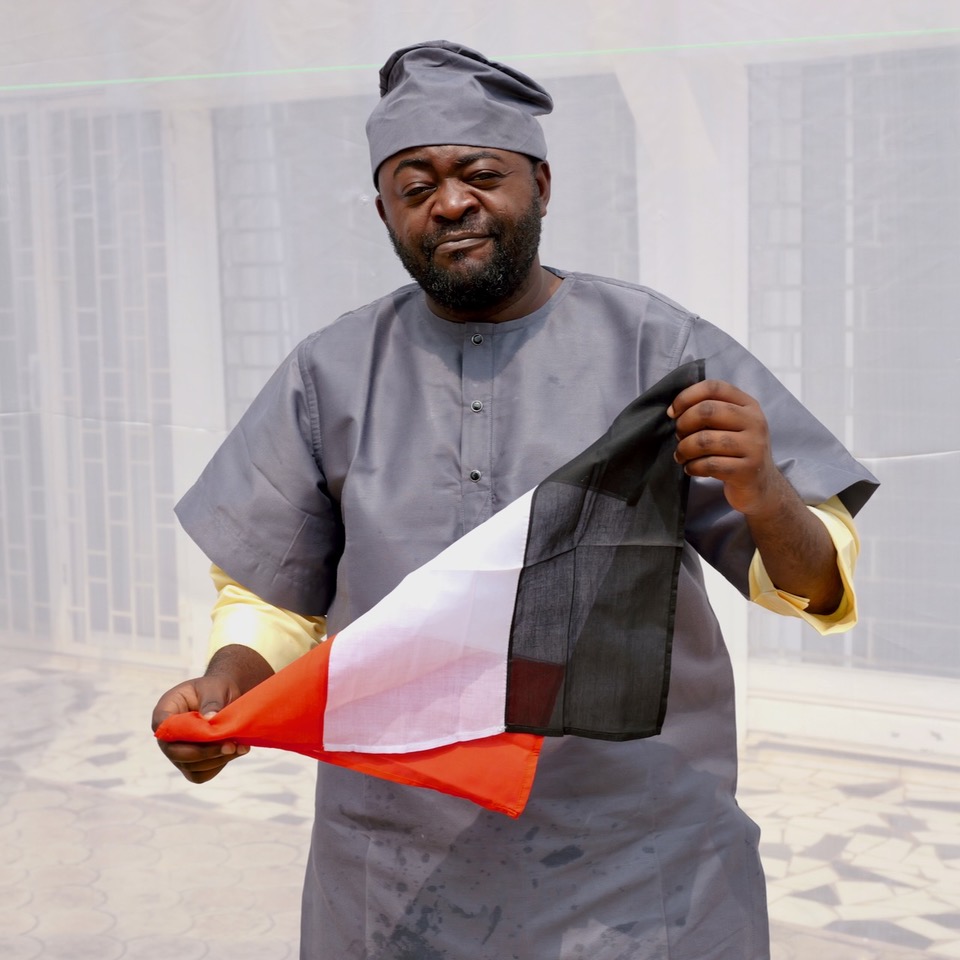
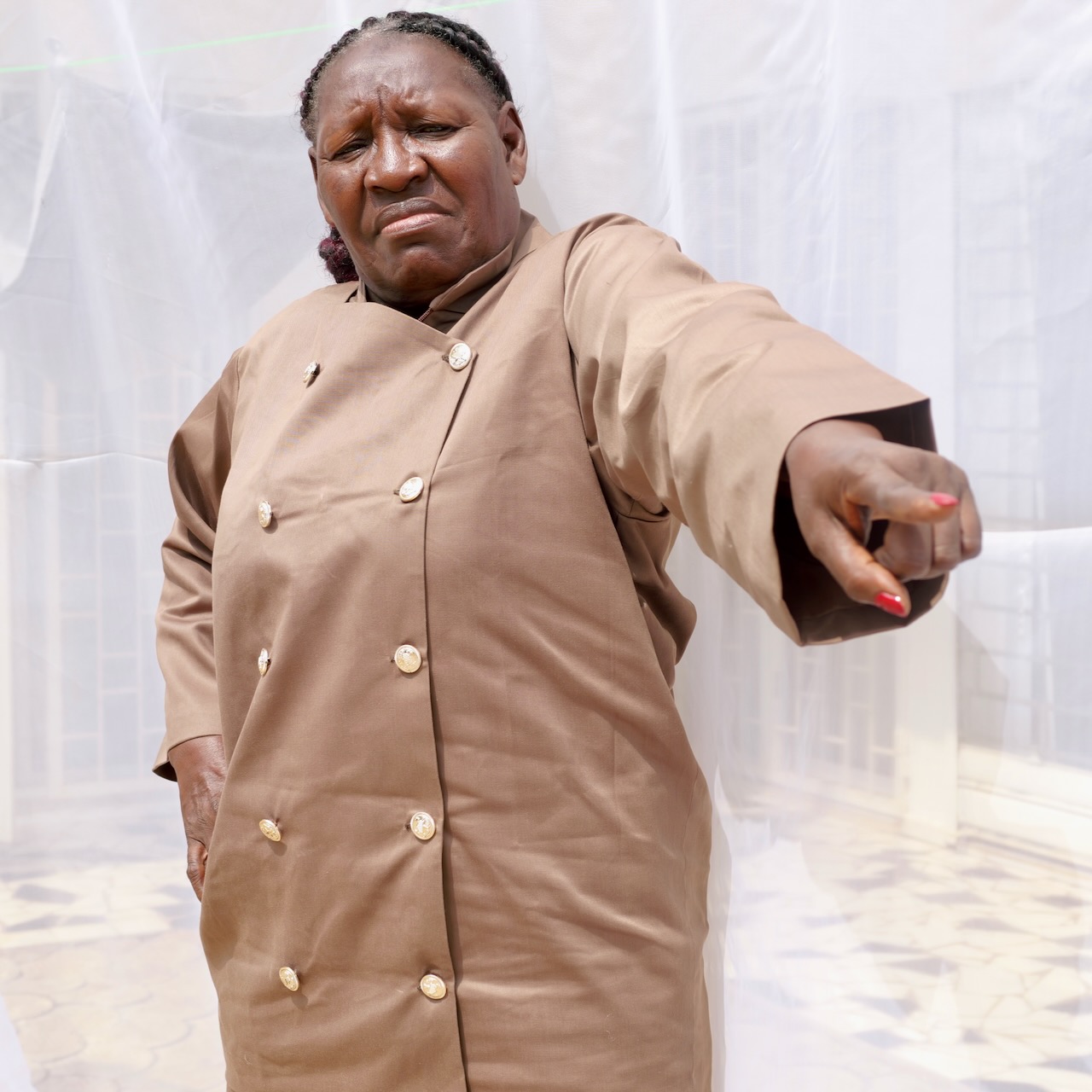
MAHOUSSI KOTCHE
is a Cameroonian artist of Beninese descent. She is a singer who loves the world of theatre. Her music, entitled EKANVODOUMISIK, is inspired by both the songs of Beninese Vodou and the traditional rhythms of Cameroon. In 2018, she won the Goethe Competition in Cameroon and has since participated in various national and international art projects and festivals.
LANDRY NGUETSA
Theatre maker, 42 years old, graduate of the University of Yaoundé 1.
director of the EMINTHA company and promoter of the ‘Scènes de Femmes’ movement, he has made a name for himself with his passion for theatre since 2017. Numerous awards and prizes in the fields of dramaturgy, acting and directing testify to his artistic commitment.
MASSAN à BIROKO
is an actress, professional storyteller, festival director, director, dramaturge, trainer and works in the film industry. She loves to learn and share. New adventures and explorations in different fields excite her a lot. She comes from Cameroon and, as her CV shows, has been active in various artistic fields for almost 40 years.
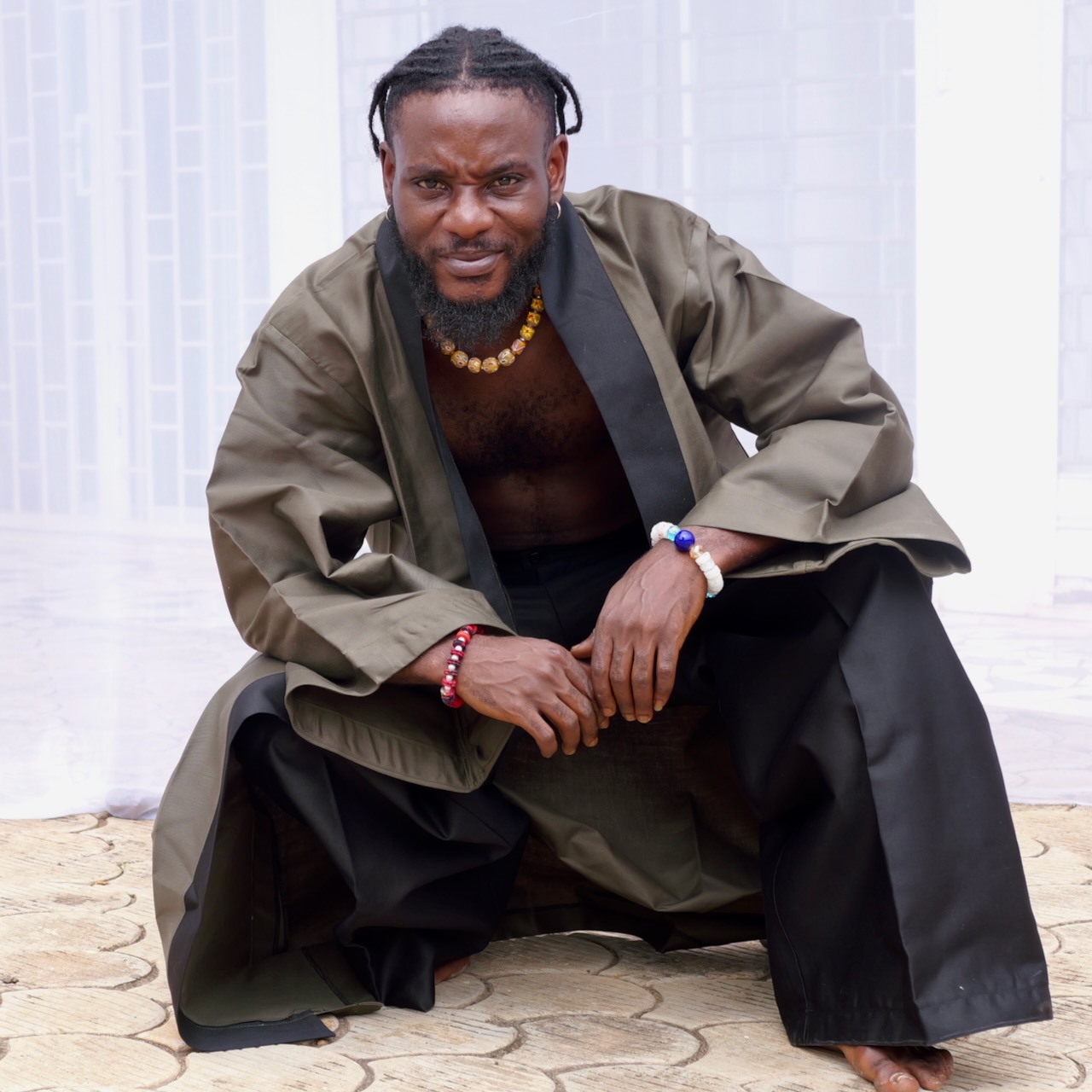
NYHOMOG LYONGA EVAN BORIS
was not only an actor in this project, but also a set and costume designer. He is a graduate of the University of Yaoundé 1 and works in the fields of theatre and film direction, stage lighting, script writing, scenography, costume, set design and sound.
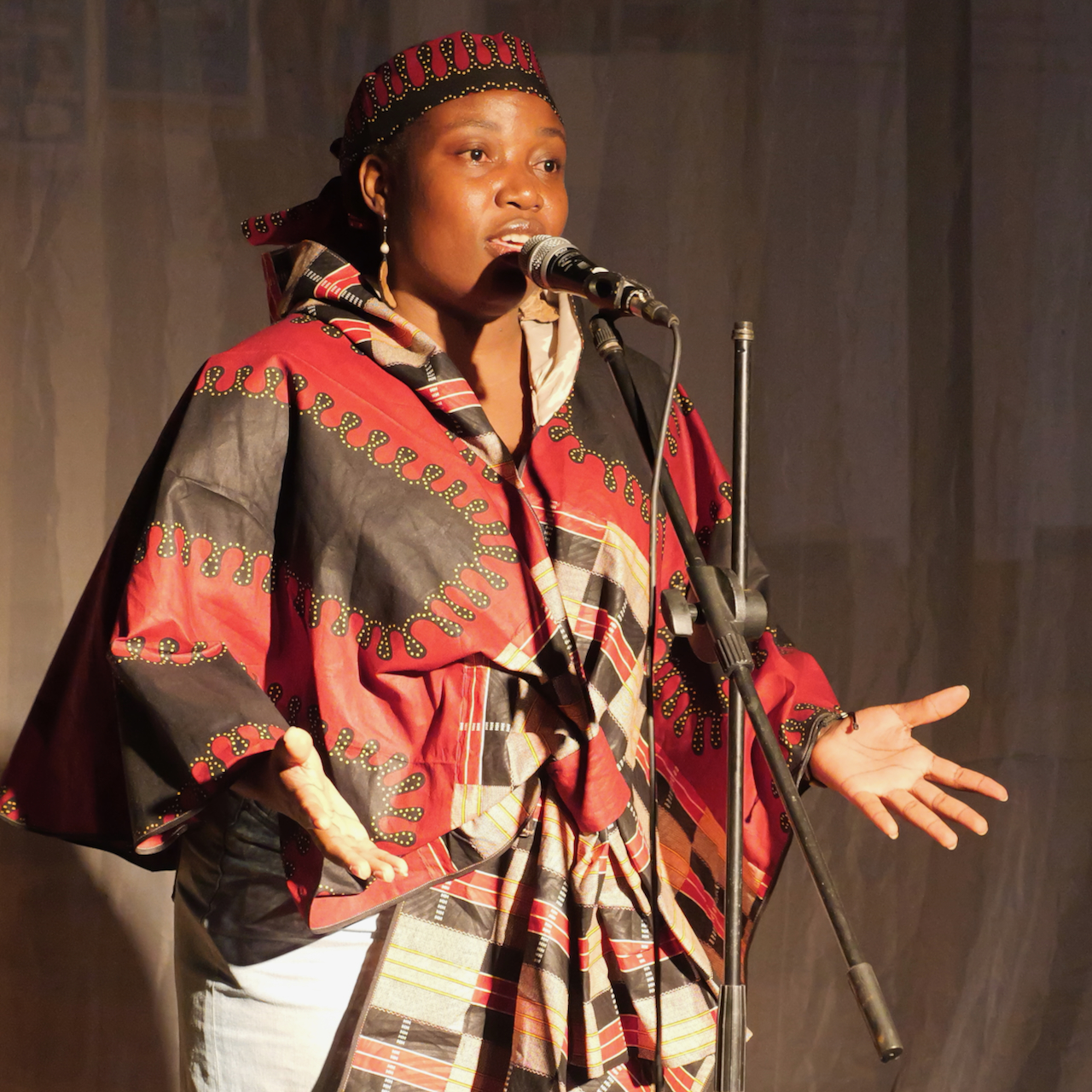
LARISSA NDJAKOMO
is a multimedia cultural journalist. After 9 years of experience at KALAK Fm 94.5 Radio, where she produced and hosted the culture and tourism programme ‘Djabama’, specialising in visual arts, live shows and heritage, she decided to pursue her career as an independent journalist. Today, she uses her voice, microphone and AI tools to explore cultural diversity, immigration, urban change and decolonisation through the lens of anthropology and journalism.
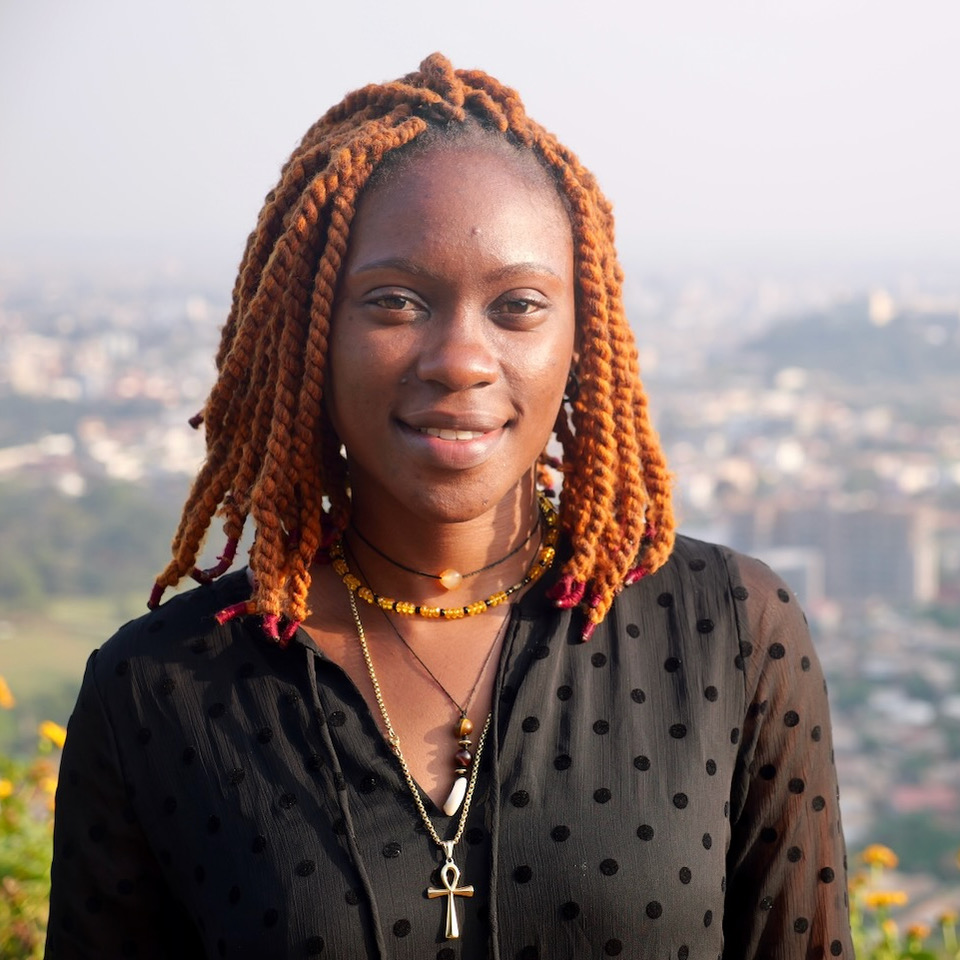
DJOUSSE NEEH SUZANNE ClEMENCE,
is a passionate actress, lighting technician and cultural manager. So far, she has worked in all three areas on this project. A graduate of the Institute of International Relations in Cameroon, she decided to combine her passion with her professional skills. So she joined the AVANT-SCENE association, where she was trained in show lighting and cultural management. In the film sector, she works with the production company Inception Arts and Com and is involved in the production of several projects.
THE COLLABORATION
The collaboration between the two organisations Paradise Garden and the Cameroonian Emintha Théâtre, under the direction of Landry Nguetsa, dates back to 2019. The theatre play ‘Cameroon, past, present and future’ was the first result of this collaboration.
This was followed in 2020 by ‘DEPARTURE ? AU?BRUCH’, a project about the resistance against Covid 19, in which the work took place online, a artistic creation from a distance in the form of texts, photos and videos.
The results of the ‘RESTITUTION ART LAB’ project, based on research into African cultural heritage, were presented at the Volksbühne am Rosantler Platz in 2022.

Financed by funds from the:
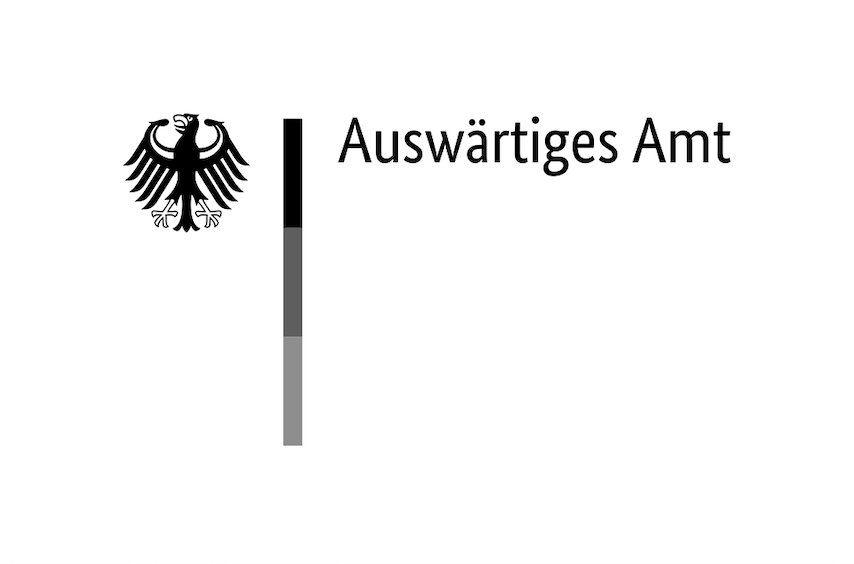
With the kind support of:
